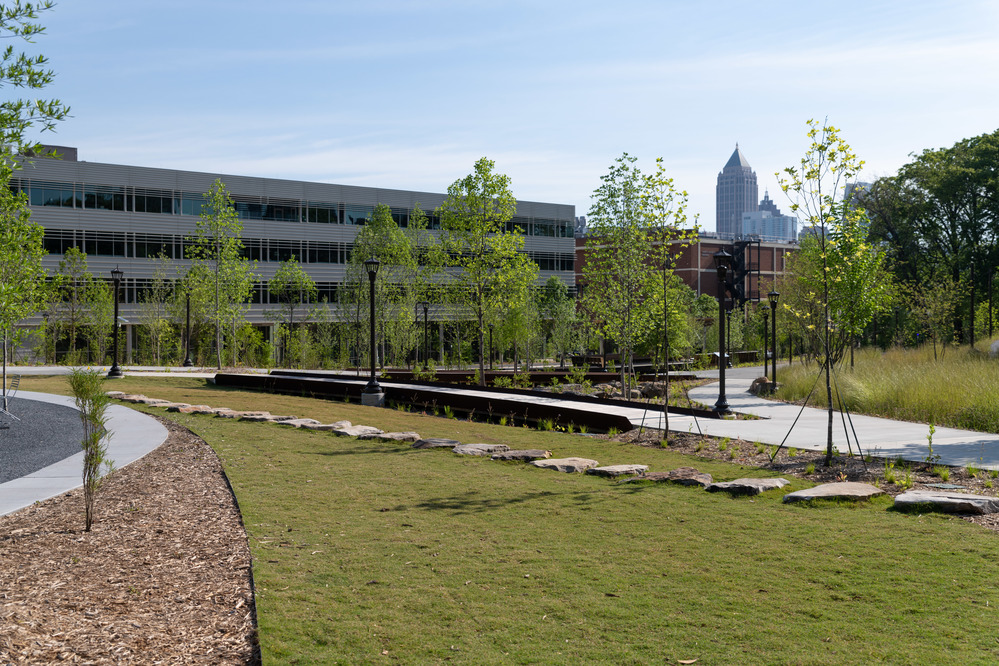(text and background only visible when logged in)
Landscaping Side Menu
(text and background only visible when logged in)
Our Committment
Extensive sustainable policies and procedures support our commitment to a healthy environment for people and planet.
Sustainable Grounds Management
Landscape Services is currently phasing in electric equipment for daily use. With end-of-year funds from FY22, we purchased blowers, shears, weed eaters, edgers, and chain saws, along with multiple batteries and chargers, for our team. We also hope to add mowers in the near future. The equipment will take the place of our regularly used gas-powered tools after leaf season is complete. While we will still keep some gas-powered equipment available for emergencies and situations that need more power, our goal is to become primarily electrified.
Here is a list of our equipment to date:
| Equipment Type | Qty |
|---|---|
| Husqvarna 550iTX backpack blower | 10 |
| Husqvarna BLi950X battery 31.1Ah | 20 |
| Husqvarna QC500 charger | 20 |
| Stihl FCA140 straight edger | 4 |
| Stihl FSA135R trimmer | 8 |
| Stihl HLA135K hedge trimmer | 4 |
| Stihl HLA66 hedge trimmer | 3 |
| Stihl AL301 battery charger | 10 |
| Stihl AP300S battery | 39 |
| Stihl MSA160C chainsaw | 1 |
| Stihl HTA135 pole saw | 1 |
| Stihl HTA85 pole saw | 1 |
With over 14,000 trees on campus, many that are deciduous, leaf management at Georgia Tech is challenging. To keep our walkways and bike paths clean and safe, we utilize a combination of giant Versa-Vacs and several smaller vacuums. During leaf season, we collect three to four loads of leaf material per week, at 60 cubic yards per load. These leaves are taken to a site at the edge of campus where they are composted to the point that the material can be used for mulch or soil amendments.
All mowers in our department are "mulching mowers." This means that they are equipped with discharge plates, mulching baffles, and mulching blades. These pieces work together to ensure proper placement of clippings. By mulching all turf on campus, we eliminate a large amount of organic waste from the landfill while providing moisture and a natural fertilizer for the turf areas.
Preserving our bio-load from landscaping activities and re-using that load on campus helps prevent the production of additional greenhouse gas emissions. When organic matter decomposes in an anaerobic environment, methane is produced. Methane is one of the most potent greenhouse gas emissions, being 25 times more potent than carbon dioxide across a 100-year period.
Our tree maintenance crew captures all wood from our maintenance and removal operations. Some of the wood logs are saved and re-used in building structures, where possible. We also require any outside contractors to leave their chips on campus. All wood chips are used on campus as healthy mulch for our smaller shrubs and beds. We estimate that this practice keeps 600-700 yards of wood chips on campus and out of the landfill.
Irrigation and Storm Water Management
The construction of the Klaus building in 2007 resulted in the installation of the first significant rain garden on the Georgia Tech Campus. This project also included reforestation as part of campus sustainability initiatives. Rain gardens are also located behind Boggs Chemistry, behind Laser Lab, in the EBB/EcoCommons, and at the Carbon Neutral Building.
Thirty-three percent of our irrigation water use is from cisterns and wells. We have set a goal to increase that number to 50% on all new construction projects. We utilize two irrigation management technologies, Calsense and Toro. This irrigation system can be remotely controlled when needed.
